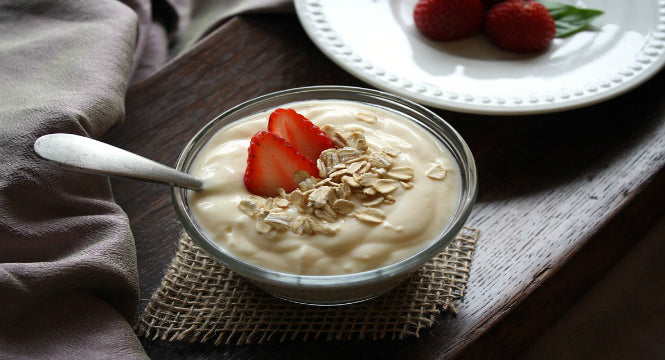Your Cart is Empty
FREE SHIPPING on US orders over $45. Save 25% With Code TAKE25 at checkout.
FREE SHIPPING on US orders over $45. Save 25% With Code TAKE25 at checkout.

Using topical probiotics for skin health is a process of adding good bacteria to your skin through your skincare routine, and using products that promote a healthy skin flora.
Many probiotic skincare products have been developed that claim the potential to calm inflammation, heal acne, and build up the skin’s barrier. Is this just another trend or are skincare producers heading in the right direction when it comes to healthy skin?
You’ve probably heard of probiotics through your supermarket shopping habits. Probiotics are live bacteria found in fermented foods like yogurts and cultured (fermented) cheese and milk products, and also in over-the-counter supplements. Ingesting these products is one way to get more of the beneficial bacteria that exist in your gut and keep your flora healthy.
If you have too much bad bacteria in your diet, it can cause digestive problems like Irritable Bowel Syndrome. Keeping your good bacteria "topped-up" improves your digestion and helps to kill off bad bacteria.
Just like the probiotics in your diet work to change the balance of bacteria in your gut, probiotics delivered topically work to adjust the balance of bacteria on your skin.
Probiotics in your skincare products help to heal connective tissue and build cells, clearing your skin from infections that might be symptomatic of a build-up of bad bacteria on your skin.
Your skin suffers every day from the damage caused by free radicals. This are stress factors on the skin like smoke, sun damage, and chemicals and toxins in the environment. Oxidative stress from free radicals can cause damage to the collagen in your skin.
Once damage has taken place to your collagen cells you begin to notice the effects of aging, acne breakouts, and dull, dry skin. Using probiotics in your skincare routine can provide the environment for reconstruct your collagen cells to enhance the look and feel of your skin.
The health of your skin microbiome is influenced by the pH balance (from 1 which is most acidic to 13, which is most alkaline) in the skin. If you adjust the pH stability one way or the other, the bad bacteria in the skin will increase. When bad bacteria increases, then you may acquire a host of diseases and infections like dermatitis, psoriasis, acne, and even skin cancer.
Skin microbiome is the term used for the microorganisms that live on the skin. The microbiome is the skin's ecosystem that fluctuates with the volume of good and bad bacteria at any one time.
Upsetting the ecosystem with a build-up of bad bacteria can cause the skin’s microorganisms to trigger into action. This may be a dormant form of bad bacteria that’s now sprung into action causing any number of skin conditions.
By adding probiotics and prebiotics to the skin, the good bacteria will flourish and fight off the bad bacteria, leaving your skin in a healthier condition.
As you age your skin loses elasticity and moisture. The skin sags and loses its healthy glow. To prevent the premature signs of aging, probiotics are beneficial for stimulating the growth of collagen, protecting the skin’s barrier from damage and moisturizing your skin. A few of the benefits that probiotics help to give to skin are:
As our skin naturally creates a barrier against the environment and other pollutants, how useful is it at creating a barrier against infections? Not very, as it turns out. If there’s any damage to the skin’s barrier, a bacterial infection can infiltrate our skin’s microbiome, causing a weakness in the fight to eradicate harmful bacteria.
To support the skin’s barrier and protect the health of the skin, probiotics will saturate the microbiome and make it easier for skin's defense mechanisms to wipe out the infection. If someone is currently taking antibiotics to fight a bacterial infection, the antibiotics will kill off both good and bad bacteria, leaving your skin unprotected against further infection.
Using a daily moisturizer with probiotics included can help your skin fortify the barrier against infections, helping to protect your general health through regulation of your immune system!
Probiotics, also known as live bacteria, have antibiotic properties included in their makeup. They fight against each other for control of the colony. The good bacteria overthrow the bad bacteria and alter the growth environment to suit their own behavior: changing the bad bacteria into good bacteria.
Using probiotics isn’t a unique concept, but has worked its way into clinical trials to study the behavior of the bacteria against skin infections. The trials are ongoing and scientists hope to one day develop more productive probiotic treatments for healing the skin.
Healthy skin can protect against environmental factors that cause inflammation. Example, in the winter your skin is much drier than normal. Another all-too common example, is the use of cleansers for the face that are too strong, removing helpful bacteria along with the harmful bacteria. If you add enough of these factors up, you have created a breeding ground for an infection of harmful bacteria.
Regular use of probiotics for skin health will keep your skin at a neutral level, neither dry nor oily. If you are looking for probiotics to ingest, always consult your health professional. When it comes to topical use of probiotics, the promise they show for keeping skin free of problems has dermatologists excited for another tool in the battle for skin health. It may be that the outcome is younger-looking skin free from unwanted issues.